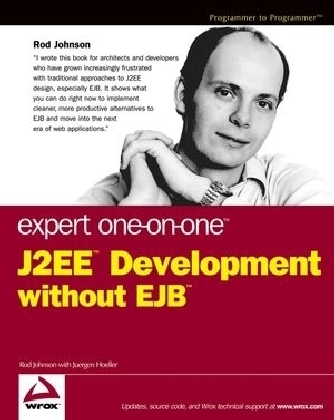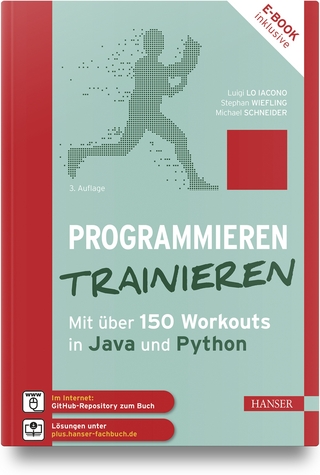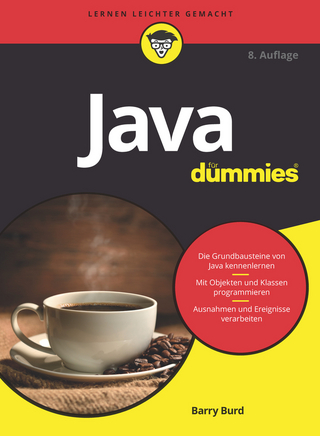
Expert One–on–One J2EE Development without EJB
Wrox Press (Verlag)
978-0-7645-5831-3 (ISBN)
- Titel ist leider vergriffen;
keine Neuauflage - Artikel merken
What is this book about? "Expert One-on-One J2EE Development without EJB" shows Java developers and architects how to build robust J2EE applications without having to use Enterprise JavaBeans (EJB). This practical, code-intensive guide provides best practices for using simpler and more effective methods and tools, including JavaServer pages, servlets, and lightweight frameworks. What does this book cover? The book begins by examining the limits of EJB technology - what it does well and not so well.Then the authors guide you through alternatives to EJB that you can use to create higher quality applications faster and at lower cost - both agile methods as well as new classes of tools that have evolved over the past few years. They then dive into the details, showing solutions based on the lightweight framework they pioneered on SourceForge - one of the most innovative open source communities. They demonstrate how to leverage practical techniques and tools, including the popular open source Spring Framework and Hibernate.This book also guides you through productive solutions to core problems, such as transaction management, persistence, remoting, and Web tier design.
You will examine how these alternatives affect testing, performance, and scalability, and discover how lightweight architectures can slash time and effort on many projects. What will you learn from this book? Here are some details on what you'll find in this book such as: how to find the simplest and most maintainable architecture for your application; effective transaction management without EJB; how to solve common problems in enterprise software development using AOP and Inversion of Control; Web tier design and the place of the Web tier in a well-designed J2EE application; effective data access techniques for J2EE applications with JDBC, Hibernate, and JDO; how to leverage open source products to improve productivity and reduce custom coding; and, how to design for optimal performance and scalability.
Rod Johnson is an enterprise Java architect with extensive experience in the insurance, dot-com, and financial industries. He was the J2EE architect of one of Europe's largest web portals, and he has worked as a consultant on a wide range of projects. Rod has an arts degree majoring in music and computer science from the University of Sydney. He obtained a Ph.D. in musicology before returning to software development. With a background in C and C++, he has been working with both Java and J2EE since their release. He is actively involved in the Java Community Process as a member of the JSR-154 (Servlet 2.4) and JDO 2.0 Expert Groups. He is the author of the best-selling Expert One-on-One J2EE Design and Development (Wrox, 2002) and has contributed to several other books on J2EE since 2000. Rod is prominent in the open source community as co-founder of the Spring Framework open source project (www.springframework.org), which grew out of code published with Expert One-on-One J2EE Design and Development. He speaks frequently at leading industry conferences. He is currently based in London. Rod can be contacted at expert@interface21.com. Juergen Hoeller is a Senior Systems architect and Consultant at werk3AT, a company that delivers complex web solutions and provides J2EE-based consulting in Austria. Juergen has a masters degree in Computer Science from the University of Linz, specializing in Java, OO modeling, and software engineering. He has worked on a wide range of projects with numerous J2EE application servers, ranging from enterprise application integration to web-based data visualization. Juergen has particular experience in developing J2EE web applications, O/R mapping, and transaction management. Juergen is co-lead of the Spring Framework and active in many community forums, including TheServerSide.
About the Authors. Introduction. Chapter 1: Why "J2EE without EJB"? Chapter 2: Goals. Chapter 3: Architectures. Chapter 4: The Simplicity Dividend. Chapter 5: EJB, Five Years On. Chapter 6: Lightweight Containers and Inversion of Control. Chapter 7: Introducing the Spring Framework. Chapter 8: Declarative Middleware Using AOP Concepts. Chapter 9: Transaction Management. Chapter 10: Persistence. Chapter 11: Remoting. Chapter 12: Replacing Other EJB Services. Chapter 13: Web Tier Design. Chapter 14: Unit Testing and Testability. Chapter 15: Performance and Scalability. Chapter 16: The Sample Application. Chapter 17: Conclusion. Last words. Index.
| Erscheint lt. Verlag | 2.7.2004 |
|---|---|
| Reihe/Serie | Expert one-on-one | Wrox Programmer to Programmer |
| Sprache | englisch |
| Maße | 187 x 231 mm |
| Gewicht | 870 g |
| Einbandart | Paperback |
| Themenwelt | Informatik ► Programmiersprachen / -werkzeuge ► Java |
| ISBN-10 | 0-7645-5831-5 / 0764558315 |
| ISBN-13 | 978-0-7645-5831-3 / 9780764558313 |
| Zustand | Neuware |
| Haben Sie eine Frage zum Produkt? |
aus dem Bereich


